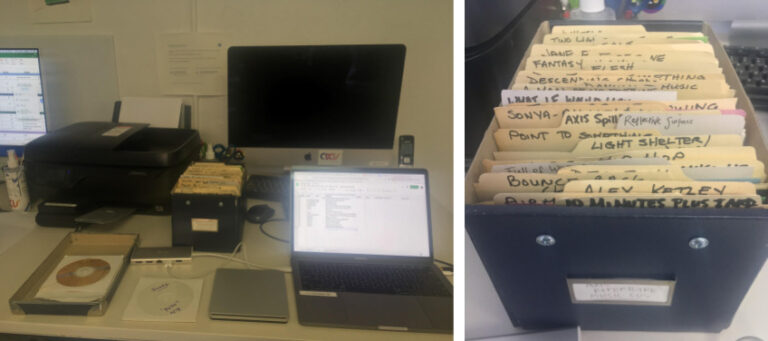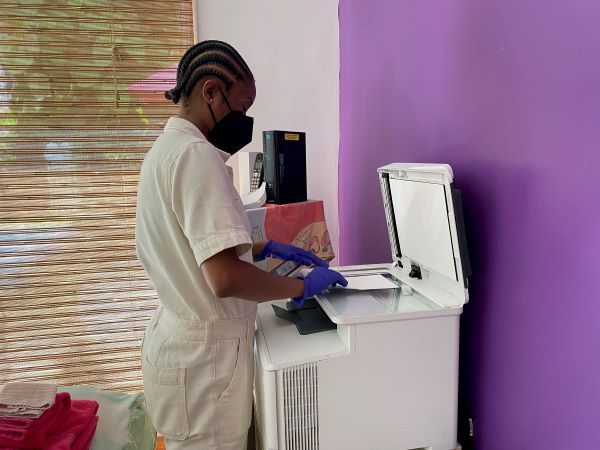Archiving Fellowships
Summer Archiving Fellowships
Dance/USA, the national service organization for dance, invites applications for the Dance/USA 2024 Archiving and Preservation Fellowship Program from master’s degree students in library and information sciences and related fields, and emerging archivists with relevant experience. The theme of this round of Fellowships, generously supported by funding from the Mellon Foundation, is Culture Bearers and Connectors.
The goal of the Archiving and Preservation Fellowship Program is to develop an engaged, passionate, and well-trained next generation of archivists in the dance ecosystem and to advance models for community-based archiving assistance to regional dance communities. Dance/USA invites applicants who are committed to advancing a more equitable and inclusive archives field that reflects and supports the true diversity of voices, practices, and identities within dance communities. Applicants should be interested in learning and applying archiving methods that are culturally sensitive and rooted in community practice. Read about Dance/USA’s previous Archiving and Preservation Fellows and their projects here.
Funding opportunities for this program are available. Please contact Director of Advancement Raechel Hofsteadter at rhofsteadter@nulldanceusa.org or 202.595.6822 to learn more.
Program Format and Project Descriptions
The theme of the 2024 Archiving and Preservation Fellowships is Culture Bearers and Connectors. Dance/USA will award four Fellowships in 2024.
Timeline and commitment: June-August 2024, approximately 450 hours total.
Locations:
- Cashion Cultural Legacy (San José, CA)
- Dianne Walker (Charlotte, NC)
- LEIMAY (Brooklyn, NY)
- The National Institute of Flamenco (Albuquerque, NM)
Find descriptions of projects and project sites below!
NOTE: The Fellowships will be in-person, hybrid, and remote. See the project descriptions below for more information.
Proof of vaccination will be required for any on-site work or attendance at in-person convenings, and Fellows must agree to follow any COVID protocols or mandates required by their host sites.
Stipend: $10,000 per Fellow
The Fellowship will be supervised and administered by Dance/USA’s Department of Archiving & Preservation. The Fellow will receive orientation and training in dance-specific concepts and resources for archiving, and will work with local mentors and organizations on projects to preserve and create access to unique dance materials. Each Fellow will be assigned to work on one of the following projects:

How to Apply
Eligibility Requirements:
Preferred: full- or part-time enrollment in a graduate program in Library and Information Science, Archives, or related subjects through at least Spring 2024. Dance/USA will consider applicants who are not in academic programs, but who have a strong interest in dance archiving and relevant skills and experience. Fellows must be available to work full-time for approximately 13 weeks during June, July, and August 2024 and able to travel for convenings. Exact start and end dates can be coordinated with academic year commitments. Applicants who identify as Black, Native, Indigenous, Person of Color (BIPOC), gender diverse, disabled, and/or as committed to advancing social justice causes, are strongly encouraged.
Application Process
Submit a resume, list of references, and a Vision, Values, and Goals Statement explaining what the applicant hopes to contribute to and gain from the Fellowship and how this opportunity aligns with career goals and personal values. This statement should highlight any experience or connection with dance/performing arts and dance legacy materials. Please include any language skills, particularly Spanish, and level of fluency. Applicants are encouraged, but not required, to express a preference for one or more of the four projects described; however, Dance/USA does not commit to assigning the applicant to the preferred project.
Deadline: 11:59pm PST, December 20, 2023
Please send Vision, Values, and Goals statement, resume, and contact and relationship (e.g. professor, supervisor) information for 3 references as one PDF named “Lastname_Firstname.pdf” to Hallie Chametzky, Director of Archiving and Preservation, hchametzky@nulldanceusa.org.
Applicant Finalists will be contacted to schedule a Zoom interview with the Dance/USA team, and may also have a second interview with a host organization.
If you have questions, contact Hallie Chametzky (hchametzky@nulldanceusa.org)
Cashion Cultural Legacy: To increase the organization and accessibility of Cashion Cultural Legacy's archives, the Fellow will work remotely to:
- Conduct an overview of digital storage systems, recommend a digital storage/database platform, and design a metadata schema appropriate for their archives and cultural context;
- Develop a manual that establishes systems and processes for organization and description of materials, and train staff in these procedures;
- Serve as a thought partner and resource for Cashion Cultural Legacy as they attempt to locate materials and make them usable for internal and external stakeholders.
*Note: this project has the potential for in-person site visits to see the physical archives but will be primarily remote.
Dianne Walker: To support the preservation of Dianne Walker's legacy and the eventual donation of her archives to a library, the Fellow will work in-person to:
- Inventory, organize, and potentially re-house portions of the collection;
- Create a guide that establishes systems and processes for organization and description of materials, and train any relevant team members;
- Conduct oral histories with Dianne Walker about her 40+ year career and life;
- Serve as a thought-partner for determining potential repositories for a future donation and as a liaison between Dianne Walker and libraries/archives.
LEIMAY: To support the organization and accessibility of LEIMAY’s digital archive, including materials related to the four years of the New York Butoh Festival, the Fellow will work in-person to:
- Digitally catalog over 600 digitized audiovisual materials to be made publicly available;
- Assist staff with data collection and organization of archival materials around LEIMAY’s creative works;
- Assist staff in the preparation of short excerpts of video and creation of written blurbs to accompany the publicly accessible video archive;
- Assess current digital taxonomies and organizational strategies, clarify systems, and create a manual that solidifies systems and processes.
National Institute of Flamenco: To support the preservation and accessibility of the National Institute of Flamenco's archives, the Fellow will work in-person to:
- Begin to inventory and organize the collection;
- Develop a manual that establishes systems and processes for organization and description of materials, and train staff in these procedures;
- Serve as a thought-partner for the ongoing accessibility of the archive to the community through potential digital and physical access points;
- Begin to conduct oral histories with staff and members of the community who hold long-term institutional and artistic knowledge.
- Fellows will share learning and discoveries from their projects in articles that will be published in Dance/USA's eJournal. View blogs by former Dance/USA Archiving Fellows.
- Fellows will receive support for professional development and networking activities, including attendance at virtual or in-person convenings.
- Fellows will assist the Dance/USA team with tracking metrics and evaluating the program’s outcomes.

Cashion Cultural Legacy (San José, CA) is a nonprofit arts organization committed to sustaining the preservation, presentation, and education of Mexican folk culture through dance. Active since 1969, CCL was founded in July, 1996 by Susan Cashion, PhD. Their core dance programming embodies two performing companies, Los Lupeños de San José & Los Lupeños Juvenil as well as public education offered through Los Lupeños Academy. Their dance projects include an Artist Exchange between California & México and a nascent Publications venture.
Dianne Walker (Charlotte, NC) One of the world’s greatest living tap dancers, Dianne Walker has been called the “Ella Fitzgerald of Tap dance.” Throughout her 40-year career, she has appeared on Broadway, on television, in film, on the international dance circuit, and in jazz clubs. She has mentored many younger dancers, including Savion Glover, and is a pioneer in the resurgence of tap. The elegance of her style earned her the nickname “Lady Di.” Walker appeared in the film Tap with Gregory Hines and Sammy Davis Jr. She was the only woman in the famous “Hoofers Line” in the 1989 Broadway production of Black and Blue. Walker has received several lifetime achievement awards.
LEIMAY (CAVE Organization Inc.) (Brooklyn, NY) is a grassroots organization and performing arts ensemble run by immigrant artists of the global majority that exists out of a converted garage space called CAVE in Williamsburg Brooklyn. Initiated by Shige Moriya of Japan in 1996 and joined by Ximena Garnica of Colombia in 2001, LEIMAY is led by artists and holds a regular NYC home season, tours nationally & internationally, offers classes to the public, brings in guest artists for workshops, and collaborates with presenting and educational partners across NYC and beyond. LEIMAY was incorporated in 2003 by Ximena and Shige who were passionate about creating a space for art to exist amongst the barriers and challenges in NYC. Their collaborative multidisciplinary works include video, sculptural, mixed-media, and light installations as well as photography, training projects, stage performances, and publications. LEIMAY supports butoh practitioners, dancers, musicians, media artists, theater artists, visual artists, performance artists, and beyond.
The National Institute of Flamenco (Albuquerque, NM) was established in 1982 by Eva Encinias. Its mission is to preserve and promote flamenco’s artistry, history, and culture by presenting the finest flamenco in the world and by educating the American family in this art form while emphasizing the positive influence of art on family and community. The Institute achieves its mission through the following primary programs: Festival Flamenco Albuquerque, est. 1987, annual series of workshops and performances featuring world-class artists and youth programming; Conservatory of Flamenco Arts, est. 1999, the largest flamenco school in the United States; Yjastros: The American Flamenco Repertory Company, est. 1999, a professional company of flamenco artists, consisting primarily of Latinx people of color; and Tablao Flamenco Albuquerque, est. 2016, an intimate performance venue, featuring improvisation among musicians and dancers.
Propelled by our belief that dance can inspire a more just and humane world, Dance/USA will amplify the power of dance to inform and inspire a nation where creativity and the field thrive.
Established in 1982, Dance/USA champions an inclusive and equitable dance field by leading, convening, advocating, and supporting individuals and organizations. Dance/USA’s core programs are focused in the areas of engagement, advocacy, research, and preservation.
In 2017, Dance/USA began the process of integrating the archiving and preservation programs of Dance Heritage Coalition (DHC). Formerly a stand-alone nonprofit, DHC was founded as an alliance of institutions holding major dance research collections with a mission to document, preserve, and create access to the legacy of dance. With the integration, Dance/USA has taken on this mission to provide archiving services to the dance field and build skills, resources, and awareness of dance heritage.
